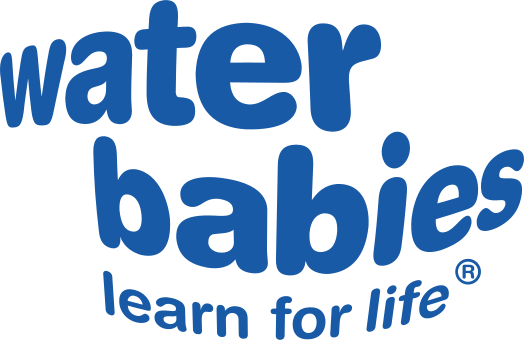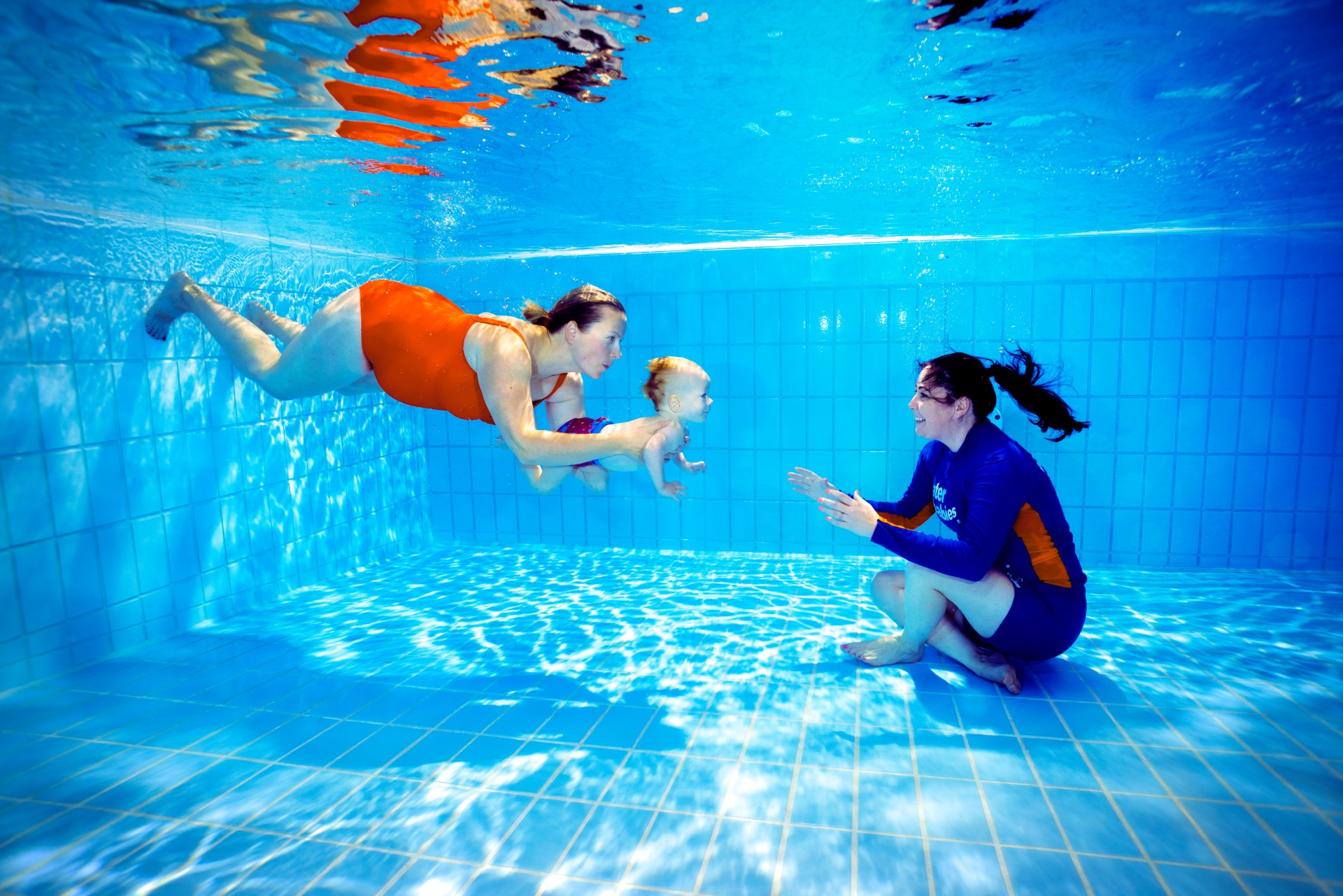Swimming is an essential life skill, and introducing your baby to the water can be a wonderful bonding experience for both of you.
Many parents are eager to help their children become confident in water early on, but it can be a bit daunting to know where to start. Let’s dive into some common questions parents have about taking their baby swimming, from, when can babies start swimming, when to start, to what to bring, to the benefits of baby and toddler swimming lessons.
What Age Can You Take a Baby Swimming?
The good news is, babies can start getting used to water as early as you’d like! According to NHS guidelines, babies can start swimming both before and after their vaccinations so there’s no need to wait. At Water Babies, we swim straight from birth using specialist hydrotherapy pools which are kept at a minimum temperature of 32°C so babies under 12 weeks or 12lbs are kept warm and protected from any bugs.
It’s never too early to start getting little ones comfortable in the water, our youngest water baby was just 1 day old! Babies have a natural affinity with water and it’s safe to swim them straight away. The safety and wellbeing of your little one is at the heart of everything we do, and we take all our cues from them. In our baby and toddler swimming lessons, we use song, play and repetition to develop your baby’s natural instincts and transform these into core aquatic skills.
Are Baby Swimming Lessons Safe?
Yes, baby swimming lessons are safe when conducted in a controlled environment with trained instructors. We never swim in pools that don’t meet our standards for temperature and chemical balance and our teachers are trained to the highest possible standard, achieving the Swim England Level 3 Teaching Pre-School Swimming (Advanced). So you can be safe in the knowledge that your baby couldn’t be in better hands than with us.
During lessons, you’ll be with your baby in the water alongside your class mates being guided through age appropriate skills teaching water safety and the fundamental basis of different swimming strokes. A key way we do this is through swimming underwater, teaching little ones to become confident, so if they ever do fall in, they’ll be able to keep themselves safe and not panic.
You might be thinking, how is my little one able to go underwater and not inhale any water? What actually happens?
Your little one is born with a reflex called the ‘laryngeal reflex’, or ‘gag reflex’. This kicks into action when your baby feels water on their face, nose or throat. When your baby goes underwater, the soft tissue at the back of their throat (called the larynx) closes to block the entrance to the airway.
And it’s at its peak in their first 6 months. But this doesn’t mean that babies can be suddenly submerged without warning. That’s why, from the get-go, we use the cue “Name, Are you ready? Go” to build up the association with this phrase and going underwater, so that your little one is always in control. We never swim your baby unless we’re absolutely sure that they are happy to go underwater. If they’re hiccuping, sleeping, crying or seem generally resistant, they’ll stay on the surface.
Using your little one’s natural reflexes from an early age and preparing them to go under the water through word association means it quickly becomes a learned response.
As our lessons progress, you’ll be amazed at how good your little one is at responding to both verbal and non-verbal cues. Ultimately, they’ll learn to breathe out while they’re underwater, which we believe gives them real empowerment and a sense of being fully in control. It’s also a great foundation in ‘aquatic breathing’, which is essential as they progress to become independent little swimmers.
Are Baby Swimming Lessons Worth It?
Absolutely! If you haven’t already been convinced to start swimming with your baby, swimming lessons also offer many benefits, not just for your child, but for you as well. Here are just some of the reasons why baby swimming lessons are worth it:
- Water Confidence: The thrill of grasping a new skill, achieving something they’ve been working on or overcoming the water wobbles will give your little one the confidence to try and learn new things. This confidence will continue outside of lessons as little ones begin to find their feet and start nursery or school!
- Bonding: The focused time in the water strengthens the bond between you and your baby, through holding them close and that skin-to-skin contact in the comforting warmth of the water. Your baby can smell you, feel your heartbeat, hear your breathing, which all helps calm and relax them (and you). This stimulation all reminds them of the security and safety of the womb. The warmth of the water is the perfect place to connect with your baby, away from the bustle of daily life. And, it’s also a place for you to have fun too.
- Physical Development: We all know that swimming is good for our physical health, but did you know it’s also good for your little one’s physical development? Being in the water helps your baby move independently before they can crawl or walk. It’s a safe place for them to explore their balance, meaning they’ll become a lot more coordinated out of the water too – so less bumps as they learn to stand on their own two feet!
- Cognitive Development: Everything we teach your baby in the water is structured to align with their key development milestones. Cross-lateral movements (ones that cross the midline of the body) like reaching for a ball build nerve pathways, helping the brain to store and retrieve information. Research has even indicated that baby swimming results in increased social, academic and personality development.
- Improved Sleep and Appetite: Baby swimming is proven to help with little one’s eating and sleeping patterns as it gets your little ones’ limbs moving, so that they have a little workout and they (and you) can get that much needed shut eye.
- Safety: Drowning is sadly still one of the leading causes of death in children. There’s no better peace of mind than knowing that your little one can keep themselves safe both around and in the water. Introducing them to the water from birth will help prevent a fear developing later and make them feel confident should they ever be in an emergency situation.
What to Take Baby Swimming?
Now you know all the reasons why you should get in the pool with your little one, you need to know what to take with you! Heading to the pool with a baby in tow requires a bit more preparation. Here’s a checklist of essentials to bring along:
- Happy Nappy™ – no other nappy will do. The Happy Nappy is tested and approved, the only one that can guarantee against leakages. You don’t want to be the party pooper of your lesson (literally!). When you buy your Happy Nappy from us, we’ll check the fit in your first lesson. Just keep the tags on. That way we can swap it if the size isn’t perfect.
- Reusable or paper swim nappy – you’ll need to wear a reusable or paper swim nappy under your Happy Nappy™ to adhere to our double layer system or you can ditch the second layer and go for a Happy Nappy DUO which has the under layer built in!
- Towel – one for your little one and one for you.
- Changing mat – our Bubba changing mat is perfect and means you can change your little one easily, wherever you are.
- Warm hat – little heads get cold easily after swimming.
- Swimwear for you – could be a little embarrassing otherwise! Many customers arrive ‘beach ready’ so all they need to do is change their little ones when they get to their lessons.
- Snacks and a drink for on the way home – swimming is great for building an appetite.
You’re ready to go!
You’re now armed with all the tools you need to get splashing with your little one. Swimming is a wonderful, stimulating activity for babies, offering countless benefits, from physical development to creating water confidence that can last a lifetime. Remember, you can start swimming as early as you like with no need to wait.
We can’t wait to welcome you to lessons and start your baby swimming journey.
Whenever you’re ready, we’re ready.


